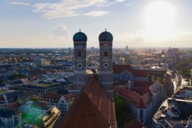Chirurgische Klinik und Poliklinik, city centre, Ziemssenstraße 5, 80336 München, tel.: (+49) 89 4400 52611
Klinikum Bogenhausen, Englschalkinger Str. 77, 81925 München, tel.: (+49) 89 9270 2151
Klinikum Harlaching, Sanatoriumsplatz 2, 81545 München, tel.: (+49) 89 6210 6666
Klinikum Neuperlach, Oskar-Maria-Graf-Ring 51, 81737 München, tel.: (+49) 89 67940 (surgical emergency room)
Klinikum Neuperlach, Oskar-Maria-Graf-Ring 51, 81737 München, tel.: (+49) 89 6794 2572 (internal medicine)
Klinikum Schwabing, Kölner Platz 1, 80804 München, tel.: (+49) 89 3068 2600
Klinikum Dritter Orden, Menzinger Str. 44, 80638 München, tel.: (+49) 89 1795 1450
Rotkreuzklinikum München, Nymphenburger Strasse 163, 80634 München, tel.: (+49) 89 1303 2543
